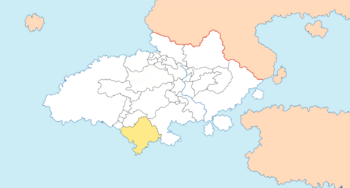Macklenover: Difference between revisions
No edit summary |
No edit summary |
||
| Line 125: | Line 125: | ||
|footnotes = <!--For any generic non-numbered footnotes--> | |footnotes = <!--For any generic non-numbered footnotes--> | ||
}} | }} | ||
The '''Kingdom of Macklenover''', commonly referred to as '''Macklenover''', is a semi-independent [[States of Dolchland|constituent state]] of the [[Dolchland|Empire of Dolchland]]. It was established in 1797 during the [[War of the Habstrian Succession]], and recognised in the [[Treaty of Morthal (1797)|Treaty of Morthal]], giving it full independence from the [[Habstria|Habstrian crown]]. Macklenover had long been a rebellious territory of the Habstrians, however in 1765 King | The '''Kingdom of Macklenover''', commonly referred to as '''Macklenover''', is a semi-independent [[States of Dolchland|constituent state]] of the [[Dolchland|Empire of Dolchland]]. It was established in 1797 during the [[War of the Habstrian Succession]], and recognised in the [[Treaty of Morthal (1797)|Treaty of Morthal]], giving it full independence from the [[Habstria|Habstrian crown]]. Macklenover had long been a rebellious territory of the Habstrians, however in 1765 King [[Leopold I of Habstria]] granted Duke [[Joesph II of Macklenover]] the title of King in Macklenover, though still under Habstrian rule, this gave them a lot more autonomy. | ||
In 1795 the War of the Habstrian Succession broke out, with a majority of the Dolchic Kingdoms fighting Habstria. The Habstrian King called Macklenover to his side however the King in Macklenover refused to raise his armies. The Habstrian King took this as an act of treason and rebellion and sent his army to capture Bertricht and the Macklenoverian royal family. Upon hearing of this the King in Macklenover took up residence in Enselhof Palace, and rallied his armies there. The Habstrian army, unable to capture the King, sacked Bertricht, destroying much of the old city, and executing nobles loyal to the Macklenoverian cause. | In 1795 the War of the Habstrian Succession broke out, with a majority of the Dolchic Kingdoms fighting Habstria. The Habstrian King called Macklenover to his side however the King in Macklenover refused to raise his armies. The Habstrian King took this as an act of treason and rebellion and sent his army to capture Bertricht and the Macklenoverian royal family. Upon hearing of this the King in Macklenover took up residence in Enselhof Palace, and rallied his armies there. The Habstrian army, unable to capture the King, sacked Bertricht, destroying much of the old city, and executing nobles loyal to the Macklenoverian cause. | ||
Revision as of 07:16, 18 November 2021
Kingdom of Macklenover Königreich Macklennover (Alemannisch) | |
|---|---|
 | |
| Status | Consitituent state of Dolchland |
| Location | Macklenover within Dolchland. |
| Capital | Schlammburg |
| Official languages | Alemannisch |
| Government | |
• King | George IX |
• Prime Minister | Ruprecht von Mittelburg |
| Legislature | Estate at Bertricht |
| House of Lords | |
| House of the Estates | |
| Decleration as Kingdom 1819 | |
• Duchy of Macklenover | 1765 |
• Kingdom in Macklenover | 1796 |
• Kingdom of Macklenover | 1819 |
The Kingdom of Macklenover, commonly referred to as Macklenover, is a semi-independent constituent state of the Empire of Dolchland. It was established in 1797 during the War of the Habstrian Succession, and recognised in the Treaty of Morthal, giving it full independence from the Habstrian crown. Macklenover had long been a rebellious territory of the Habstrians, however in 1765 King Leopold I of Habstria granted Duke Joesph II of Macklenover the title of King in Macklenover, though still under Habstrian rule, this gave them a lot more autonomy.
In 1795 the War of the Habstrian Succession broke out, with a majority of the Dolchic Kingdoms fighting Habstria. The Habstrian King called Macklenover to his side however the King in Macklenover refused to raise his armies. The Habstrian King took this as an act of treason and rebellion and sent his army to capture Bertricht and the Macklenoverian royal family. Upon hearing of this the King in Macklenover took up residence in Enselhof Palace, and rallied his armies there. The Habstrian army, unable to capture the King, sacked Bertricht, destroying much of the old city, and executing nobles loyal to the Macklenoverian cause.
Realising that his army could not defeat the insurmountable force of the Habstrians, the Macklenoverian King decided to place his troops in the more capable and experienced hands of the Panedonians. Within six months all of Macklenover was liberated, and the Kingdom of Macklenover was declared in the King George Square in Bertricht, surrounded by buildings scorched by Habstrian troops.
Habstria recognised the independence of Macklenover in 1797 as a term of the Treaty of Morthal, the Panedonian King was insistant on the survival of an independent Macklenover, as not only would it weaken the Habstrians, but also provide a loyal and wealthy ally to Panedonia.

